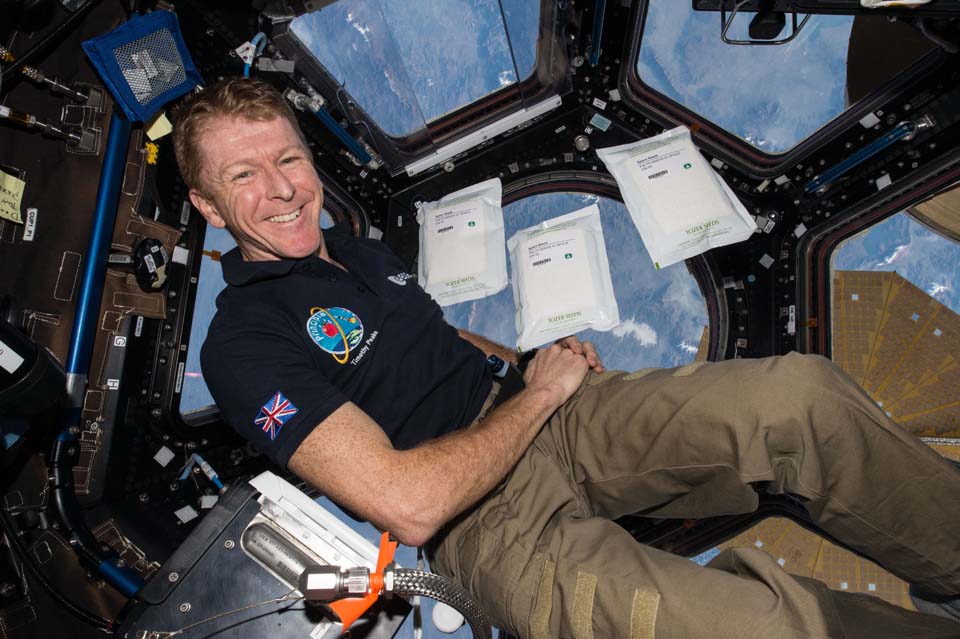
 Science students at Unity Academy Blackpool have recently become space biologists and are embarking on a voyage of discovery by growing seeds that have been into space!
Science students at Unity Academy Blackpool have recently become space biologists and are embarking on a voyage of discovery by growing seeds that have been into space!
In September, 2kg of rocket seeds were flown to the International Space Station (ISS) on Soyuz 44S where they have spent several months in microgravity before returning to Earth last month (March 16). The seeds have been sent as part of Rocket Science, an educational project launched by the RHS Campaign for School Gardening and the UK Space Agency.
Unity Academy Blackpool is one of 8600 schools across the country to receive a packet of seeds and this week, the students began planting them!
(Pictured, left to right: Adam Niewinski, Aneka Ali, Sophie Lynn & Michael Lynn)
Each class across the all-through academy, from reception to year 11, have their very own batch of space seeds to look after and monitor over the next seven weeks. The pupils will then compare the growth of the space seeds alongside regular seeds to see how spending several months in microgravity has affected them.
The out-of-this-world, nationwide science experiment will enable the students to think more about how we could preserve human life on another planet in the future, what astronauts need to survive long-term missions in space and the difficulties surrounding growing fresh food in challenging climates.
Science Faculty Lead at Unity Academy, Lynn Bilton said: “The project encourages children of all ages to take part and as we are an all-through academy from ages 2-16, it allows our entire school community to be involved”
 On Monday 18th April, British astronaut Tim Peake sent a special message from space to all of the children taking park in the Rocket Science project. Tim, who delivered the message from the International Space Station where he’s been since December, wished the 600,000 young people signed up to the experiment good luck with their investigations into the impact of micro-gravity and space travel on seed germination and growth. The results will help to form a clearer picture of the potential for astronauts to grow their own food to sustain them on long-term missions.
On Monday 18th April, British astronaut Tim Peake sent a special message from space to all of the children taking park in the Rocket Science project. Tim, who delivered the message from the International Space Station where he’s been since December, wished the 600,000 young people signed up to the experiment good luck with their investigations into the impact of micro-gravity and space travel on seed germination and growth. The results will help to form a clearer picture of the potential for astronauts to grow their own food to sustain them on long-term missions.
Speaking while 400km above the surface of the Earth, Tim said: “This is a really exciting week for the hundreds of thousands of young people across the country who will begin their Rocket Science experiments. I’d like to wish everyone taking part the best of luck with their investigations and I look forward to seeing some of the results.
“It’s possible that among those pupils taking part in the project are the young people who will help mankind reach the next big milestones in space exploration for the benefit of people on Earth. I hope the RHS Campaign for School Gardening’s Rocket Science experiment will spark curiosity and wonder amongst young people who may become the next generation of horticultural scientists.”
With more than 8,600 schools and educational groups poised to begin their Rocket Science experiment this week, the project is now among the biggest mass science experiments conducted in UK schools.
Rocket Science will see school pupils across the country spend 35 days analysing the growth and development of two batches of seemingly identical rocket seeds. However, one batch of seeds has spent time in space with Tim on the International Space Station, orbiting the Earth at 17,000mph. The aim of the experiment is to enthuse young people about science and horticulture and provide the European Space Agency with key insights into some of the challenges of growing food in space. Rocket Science is just one educational project from a programme developed by the UK Space Agency to celebrate British ESA astronaut Tim Peake’s Principia mission to the ISS and inspire young people to look into careers in STEM (science, technology, engineering and maths) subjects, including horticulture.
Follow the project on Twitter: @RHSSchools #RocketScience